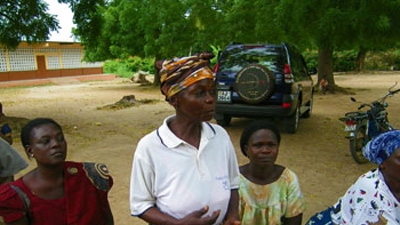WASHINGTON, January 19, 2010—Almost 500 people in 10 towns and villages across Liberia, Madagascar and Togo participated in World Bank-sponsored workshops from May to September 2010 aimed at gathering input from low-income communities about how best the Bank can help meet their energy needs.
The pioneering workshops, part of the World Bank Group Energy Strategy consultations, took the discussion out of urban centers and into communities where energy needs are great.
“The people we spoke to said they are not used to being listened to about the realities in which they live,” said Vonjy Rakotondramanana, World Bank Energy Specialist in Madagascar and organizer of six local consultations. “Many, even people living in electrified areas, told us that they remain unconnected because the connection fee is too expensive and the service is poor, so getting access is still their top priority, even above water and education.”
Energy access remains a challenge
While there has been investment by the World Bank in the three countries where the consultations were held, many areas remain off the national grid and without a stable and affordable power-supply.
“If we have access to energy the rest will follow because with energy we have water, our children will be healthy and can succeed in school and our businesses will flourish,” said Ayaovi Gokla, president of the Village Development Association in Ayakope, Togo.
For many, the primary concern was the urgent need for an affordable, reliable power supply. For women, a constant theme was the challenge of running households without a reliable electricity supply while dealing with the poor health and fire hazards that kerosene lanterns pose.
Poorly connected areas also increase insecurity, according to residents. Crime is higher in poorly lit areas and informal connections to households often leave open wires dangling precariously in public spaces. In Adetikope, Togo, wires hanging near a school had electrocuted one child.
“Darkness in our health center has caused loss of life, so we are hopeful for this (World Bank consultation) initiative and we will utilize it to the best of our ability to save lives,” said one participant in Gbarnga, Liberia.
The contributions from community-members—teachers, healthcare workers, farmers, market sellers and students—when combined with the Multi-Stakeholder Energy Consultations conducted in other parts of Africa (Benin, Egypt, Kenya, and Mozambique), provided a better understanding of the local communities’ daily obstacles.
Renewable Energy
In Togo, there is broad understanding of the need to protect forests and avoid land degradation. Despite this, a majority of the people remained unfamiliar with wind and solar options. Community members agreed that harnessing free sunlight is a great alternative to costly fuels, but questioned up-front costs and output limitations. Residents of Ayakope, who had had experience with an NGO-funded solar power system, were particularly disillusioned after the system fell into disrepair and panels were stolen.
In Liberia, residents had more experience with solar energy and expressed support for solar initiatives. However, concerns ran high over price gouging by local merchants and inadequate government oversight and/or consumer protection.
In Gbarnga town, about 200 kilometers from Liberia’s capital Monrovia, residents agreed a lantern or solar home system would benefit them greatly and were willing to pay anywhere from US$30 for a lantern, to several thousand for a solar power system. A World Bank Sustainable Solar Market Packages (SSMP) program, aimed at addressing the lighting issue, is planned for Gbarnga in the near future.
“Many people know and like the solar systems used in clinics here, but for expansion to domestic use, they worry about being duped by retailers on the pricing,” said Kristen Stoup, Energy Analyst at the World Bank’s office in Monrovia, who helped coordinate the two Liberia consultations in coordination with the government agency Rural Renewable Energy Agency. “This feedback is invaluable in helping us ensure there is a framework in place to support market-based efforts.”
Biomass and cooking
While many discussions centered on lighting, the question of finding alternatives to conventional biomass cook stoves dominated every consultation in Africa, raising concerns that the Bank’s 2011 Energy Strategy intends to address. People expressed the need for more efficient stoves that emit less smoke, for instance. In the remote town of Zoweinta, Liberia, villagers wanted to be educated on alternative cooking methods.
“We are long suffering from cooking with wood and coal,” said one woman. “Use government money to stop the suffering.”
Cell phones and computers
Africa’s wireless revolution and GSM signals now reach 50 percent of Africans. However, the consultations held in poorer communities brought home the fact that people need power to use their phones or computers.
Many participants bemoaned their journeys, by unlit country roads, to neighbouring villages just to recharge cell phone batteries. In Ayakope, the local solution is to hire motorbike drivers to take cell phones to the nearest powered village to be recharged for a fee.
“We pay US.40 cents per phone, plus we pay the motorbike driver. It’s not ideal,” said one participant.
Added to this, the lack of power has left donated computers unusable in Liberia.
In the course of the meetings many called for consultations to be an ongoing process so their voices are heard throughout development project planning and implementation.
“There must be a sense of joint ownership and of coming to the solutions together so that the very best services are provided to people,” said S. Vijay Iyer, Sector Manager of the World Bank’s Africa Energy Unit. “Combining the views and needs of people living in low income communities with those of other stakeholders has been invaluable as we build toward the new World Bank Energy Strategy.”

